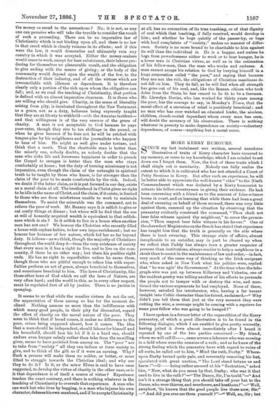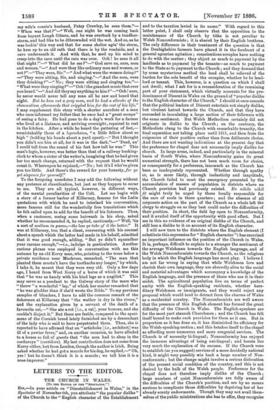MORE KERRY HUMOURS.
INCE my last instalment was written, several anecdotes L. illustrative of traits of Kerry character have recurred to my memory, or come to my knowledge, which I am minded to set down ere I forget them. Now, the first of these traits which I shall single out is mendacity. Nobody can fully realise the extent to which it is cultivated who has not attended a Court of Petty Sessions in Kerry. But after such an experience, he will be better able to appreciate the well-known " rider " to the Ninth Commandment which was declared by a Kerry humourist to actuate his fellow-countrymen in giving their evidence. He had been conversing with a friend as to the amount of false-witness borne in court, and on learning that while there had been a great deal of swearing on behalf of those accused, there was very little against them, summed up the situation by observing that the peasantry evidently construed the command, "Thou shalt not bear false witness against thy neighbour," to cover the permis. sion, "Thou mayest bear false witness in his favour." One of the shrewdest Magistrates on the Bench has stated that experience has taught him that the truth is generally on the side where there is least swearing. This strange state of affairs, almost inexplicable to an outsider, may in part be cleared up when we reflect that Paddy has always been a greater respecter of persons than institutions, always readier to help a neighbour in a strait than to assist in the maintenance of law and order,—in fact, very much of the same way of thinking as the Irish emigrant who, when asked in New York what his politics were, replied that "he was agin' the Government." At the time when the tele- graph-wire was put up between Killarney and Valentia, one of the resident gentry was telling another of his efforts to persuade the people not to tamper with or destroy the wire, and men- tioned the various arguments he had employed. None of these, however, satisfied his interlocutor, who, having a far keener insight into Celtic character than his friend, exclaimed,—" Why didn't you tell them that just at the very moment they were cutting the wire, a message might be coming with a reprieve for some poor fellow who was going to be banged ?"
I have spoken in a former letter of the superstition of the Kerry peasantry, of which a good illustration is to be found in the following dialogue, which I am enabled to give pretty correctly, having jotted it down almost immediately after I heard it repeated by one of the two parties concerned :—My friend, whom we will call G—, came across a labourer who was mowing in a field where were the remains of a rath ; and as he knew of the strong feeling which the peasantry have with regard to ruins of all sorts, he called out to him, "Mind the rath, Darby." Where. upon Darby turned quite pale, and reverently removing his hat, ejaculated with great unction, "The Lord stand !Atone us and harm !"—G— being rather amused at his " fiustration," asked him, "Now, what do you mean by that, Darby ; who was it that used to live in the rath P"—" The Danes, Sir, I'm tould."—" And isn't it a strange thing that you should take off your hat to the Danes, who were thieves, and murderers, and heathens?"—" Well, annyhow, 'tis known that the good people live there now, Sir." —" And did you ever see them yourself ?"—" Well, no, Sir ; but my wife's cousin's husband, Patsy Crowley, he seen them."— " When was that ?"—" Well, one night he was coming back from beyant Lough Gitane, and he was overtook by a tundher- storm, and had like to be dthrownded wid the wet. And so, as he was lookin' this way and that for some shelter agin' the storm, he kern up to an old mth that there is by the roadside, and a cave underneath it. And with that, he med up his mind to creep into the cave until the rain was over. Och ! he seen it all that night !"—" What did he see P"—" God save us, sure, men and women."—" And were they like ordinary men and women, or not?"—" They were, Sir."—" And what were the women doing?" —"They were sitting, Sir, and singing."—"And the men, were they drinking P"—" No; they were sitting and singing too."— " What were they singing?"—" Och ! the grandest music that ever youheard."—" And did they say anything to him?"—" Och ! sure, he never would never tell any man all he saw and heard that night. But he kern out a grey man, and he had a sthroke of the rheumatism afterwards that crippled him for the rest of his life." I may supplement this story with a shorter anecdote of a man who once informed my father that he once had a "great escape" of seeing a fairy. He had gone to do a day's work for a farmer who lived at a distance, and arriving overnight, repaired to rest in the kitchen. After a while he heard the pattering of feet,— unmistakably those of a leprechaun, "a little fellow about so high" (bolding his hands about a yard apart).—" But I thought you didn't see him at all, for it was in the dark."—" 'Deed, an' I could tell from the sound of his feet how tall he was." This man's logic, however, was better than that of a railway booking- clerk to whom a sister of the writer's, imagining that he had given her too much change, returned with the request that he would count it. Whereupon he rejoined,—" No; but it's I who've given you too little. And there's the reward for your honesty, for ye get sixpence for yourself."
To the foregoing anecdotes I may add the following without any pretence at classification, but just as they happen to occur to me. They are all typical, however, in different ways, of the mental peculiarities of the Celt. Let me begin with a story of a former barber of Killarney, famous for the Latin quotations with which he used to interlard his conversation, more famous still for the wonderfully free translations which he felt called upon to add for the benefit of his listeners. Thus, when a customer, seeing some hairwash in his shop, asked whether he recommended it, he replied, cautiously,—" Well, 'tis a sort of multum in parvo,—the less ye take of it the better." It was at Killarney, too, that a client, conversing with his counsel about a speech which the latter had made in his behalf, admitted that it was good enough, adding, "But ye didn't squandher your carcass enough,"--i.e., indulge in gesticulation. Another carious phrase was employed in conversation with me this autumn by an old Kerry man, who, pointing to the trees below a private residence near Muckross, remarked, "The man that planted them mustn't have the toothache any longer," by which, I take it, he meant that they were very old. Only a few days ago, I heard from West Kerry of a horse of which it was said that "he was as handy with his hind legs as a pugilist." This may serve as a pendant to the Galway story of the mare who " threw " a wonderful " lep," of which her master remarked that "he was gladder than if she'd wrote the Bible." To my previous samples of blunders, I have to add the common remark of the fishermen at Killarney that "the wather is dry in the rivers," and the explanation given by a servant of the death of a favourite cat,—" She ate a rot [i.e., a rat], your honour, and she couldn't disject it." But these are feeble, compared to the speci- mens of the Cornish breed lately furnished me by a descendant of the lady who is said to have perpetrated them. Thus, she is reported to have affirmed that an "artichoke [i.e., architect] was ill of a pewter fever," and, on another occasion, to have alluded to a house so fall of guests that "the men had to sleep in the corduroys" (corridors). My last contribution does not come from Kerry either, but from London, though the author is Irish. Being asked whether he had gota muzzle for his dog, he replied,—" Oh, yes ! but he doesn't think it is a muzzle ; we tell him it is a nose-improver."







































 Previous page
Previous page